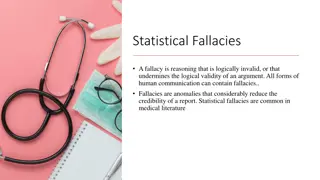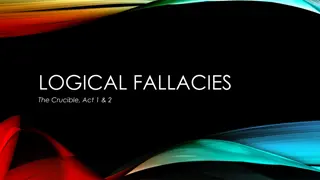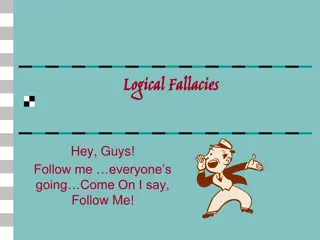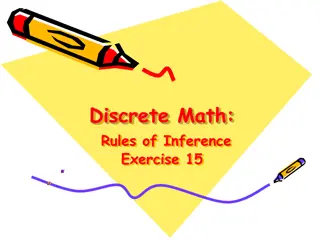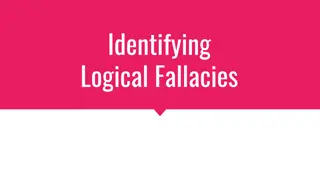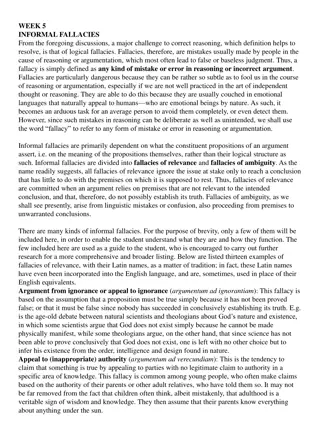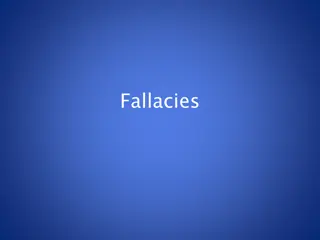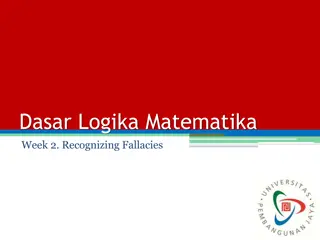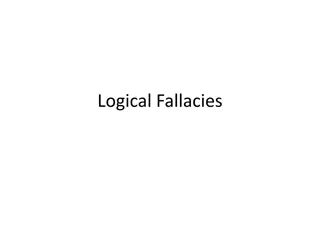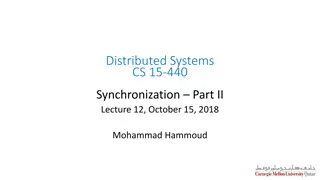Understanding Logical Fallacies: Common Types and Examples
Logical fallacies are errors in reasoning that can undermine the validity of arguments. This content covers various types of fallacies such as circular logic, either/or fallacy, oversimplification, overgeneralization, stereotyping, and ad hominem attacks. Examples and explanations are provided for each type to help readers recognize and avoid these pitfalls in logical reasoning.
Download Presentation

Please find below an Image/Link to download the presentation.
The content on the website is provided AS IS for your information and personal use only. It may not be sold, licensed, or shared on other websites without obtaining consent from the author. Download presentation by click this link. If you encounter any issues during the download, it is possible that the publisher has removed the file from their server.
E N D
Presentation Transcript
What is a logical fallacy? A logical fallacy is faulty reasoning or an error in logic (logos). Sometimes an argument appears to make sense but isn t valid because it is based on a fallacy.
Types of logical fallacies Circular logic Either/or fallacy Oversimplification Overgeneralization Stereotyping Ad hominem/attacking the person
Types of fallacies (cont.) Evading the issue Non sequitur False cause False analogy Hasty generalization
1. Circular logic Supporting a statement by simply repeating it in different words https://www.youtube.com/watch?v=jM3aCHIk_js
2. Either/or fallacy A statement that suggests that there are only two choices available in a situation that really offers more than two options https://www.youtube.com/watch?v=XYpjbKj3eo4
3. Oversimplification An explanation of a complex situation or problem as if it were much more simple than it is https://www.youtube.com/watch?v=iFXguSlV78Y
4. Overgeneralization A generalization that is too broad. You can often recognize the use of words like all, everyone, every time, anything, no one, and none. https://www.youtube.com/watch?v=2wtbRlfM0PE
5. Stereotyping A dangerous type of overgeneralization. Stereotypes are broad statements about people on the basis of their gender, ethnicity, race, or political, social, professional, or religious group. https://www.youtube.com/watch?v=ASDzcvyatgw
6. Ad hominem/attacking the person An attempt to discredit an idea by attacking the person or group associated with it. Candidates often engage in name-calling during political campaigns. https://www.youtube.com/watch?v=Q5ktq5Cccac
7. Evading the Issue Refuting an objection with arguments and evidence that do not address its central point. https://www.youtube.com/watch?v=YKWhcw-hHIw
8. Non Sequitur A conclusion that does not follow logically from the proof offered to support it. A non sequitur is sometimes used to win an argument by diverting the reader s attention to proof that cannot be challenged. https://www.youtube.com/watch?v=VRZk62QNOsM
9. False cause The mistake of assuming that because one event occurred after another event in time, the first event caused the second one to occur. https://www.youtube.com/watch?v=qMP4OXoOBtU
10. False analogy A comparison that does not hold up because of a critical difference between the two subjects. https://www.youtube.com/watch?v=PpbL-wyy678
11. Hasty generalization A conclusion drawn from too little evidence or from evidence that is biased. https://www.youtube.com/watch?v=YiVJldSU7Fk&list=PLGvvjsVt2fPQorcSmvH Yj-UJfEEhdZd_e&index=9
Circular logic Activity: 1. Either/or Fallacy 2. Oversimplification 3. Overgeneralization 4. Stereotyping 5. With a partner or group create your own fallacy from one of the logical fallacies you have just learned. You will draw a card randomly from the teacher with the name of the fallacy on it. Create the scenario with enough detail in order for the rest of the class to guess what it is. Keep your assignment a secret from the rest of the class. Be ready to present your logical fallacy to the class in the form of a video. All of the videos will be uploaded into one folder. Ad hominem/attacking the person 6. Evading the issue 7. Non sequitur 8. False cause 9. 10. False analogy 11. Hasty Generalization






